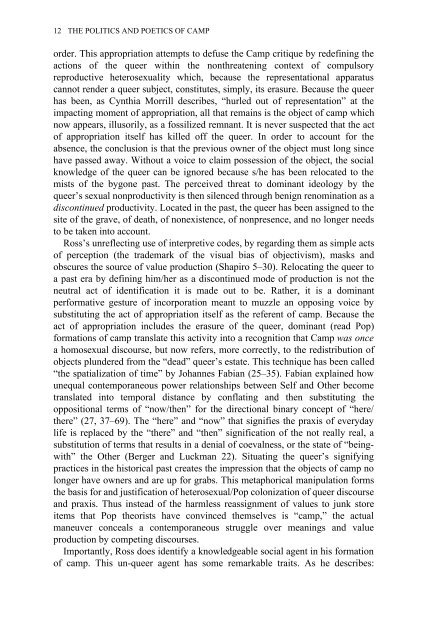Edited by Moe Meyer - Get a Free Blog
Edited by Moe Meyer - Get a Free Blog
Edited by Moe Meyer - Get a Free Blog
Create successful ePaper yourself
Turn your PDF publications into a flip-book with our unique Google optimized e-Paper software.
12 THE POLITICS AND POETICS OF CAMP<br />
order. This appropriation attempts to defuse the Camp critique <strong>by</strong> redefining the<br />
actions of the queer within the nonthreatening context of compulsory<br />
reproductive heterosexuality which, because the representational apparatus<br />
cannot render a queer subject, constitutes, simply, its erasure. Because the queer<br />
has been, as Cynthia Morrill describes, “hurled out of representation” at the<br />
impacting moment of appropriation, all that remains is the object of camp which<br />
now appears, illusorily, as a fossilized remnant. It is never suspected that the act<br />
of appropriation itself has killed off the queer. In order to account for the<br />
absence, the conclusion is that the previous owner of the object must long since<br />
have passed away. Without a voice to claim possession of the object, the social<br />
knowledge of the queer can be ignored because s/he has been relocated to the<br />
mists of the <strong>by</strong>gone past. The perceived threat to dominant ideology <strong>by</strong> the<br />
queer’s sexual nonproductivity is then silenced through benign renomination as a<br />
discontinued productivity. Located in the past, the queer has been assigned to the<br />
site of the grave, of death, of nonexistence, of nonpresence, and no longer needs<br />
to be taken into account.<br />
Ross’s unreflecting use of interpretive codes, <strong>by</strong> regarding them as simple acts<br />
of perception (the trademark of the visual bias of objectivism), masks and<br />
obscures the source of value production (Shapiro 5–30). Relocating the queer to<br />
a past era <strong>by</strong> defining him/her as a discontinued mode of production is not the<br />
neutral act of identification it is made out to be. Rather, it is a dominant<br />
performative gesture of incorporation meant to muzzle an opposing voice <strong>by</strong><br />
substituting the act of appropriation itself as the referent of camp. Because the<br />
act of appropriation includes the erasure of the queer, dominant (read Pop)<br />
formations of camp translate this activity into a recognition that Camp was once<br />
a homosexual discourse, but now refers, more correctly, to the redistribution of<br />
objects plundered from the “dead” queer’s estate. This technique has been called<br />
“the spatialization of time” <strong>by</strong> Johannes Fabian (25–35). Fabian explained how<br />
unequal contemporaneous power relationships between Self and Other become<br />
translated into temporal distance <strong>by</strong> conflating and then substituting the<br />
oppositional terms of “now/then” for the directional binary concept of “here/<br />
there” (27, 37–69). The “here” and “now” that signifies the praxis of everyday<br />
life is replaced <strong>by</strong> the “there” and “then” signification of the not really real, a<br />
substitution of terms that results in a denial of coevalness, or the state of “beingwith”<br />
the Other (Berger and Luckman 22). Situating the queer’s signifying<br />
practices in the historical past creates the impression that the objects of camp no<br />
longer have owners and are up for grabs. This metaphorical manipulation forms<br />
the basis for and justification of heterosexual/Pop colonization of queer discourse<br />
and praxis. Thus instead of the harmless reassignment of values to junk store<br />
items that Pop theorists have convinced themselves is “camp,” the actual<br />
maneuver conceals a contemporaneous struggle over meanings and value<br />
production <strong>by</strong> competing discourses.<br />
Importantly, Ross does identify a knowledgeable social agent in his formation<br />
of camp. This un-queer agent has some remarkable traits. As he describes:


